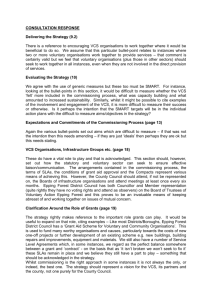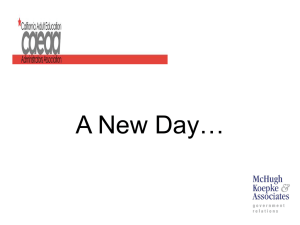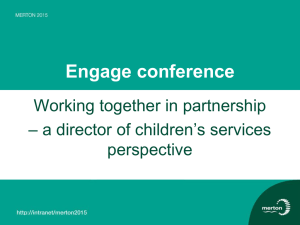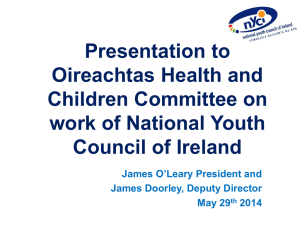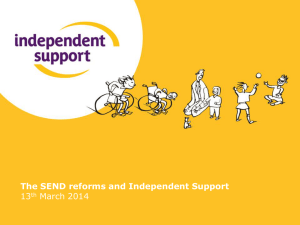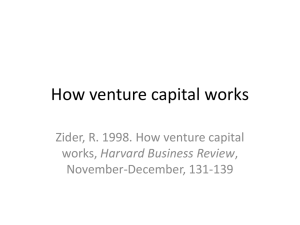VCS Infrastructure Support - Early Spend Programme
advertisement
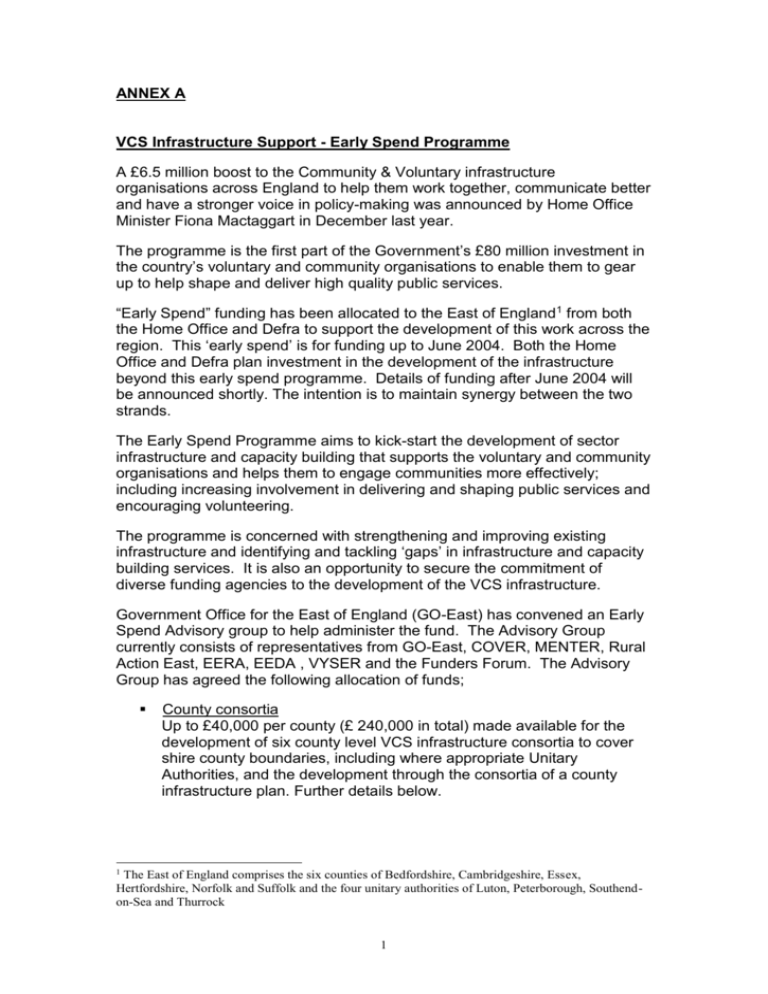
ANNEX A VCS Infrastructure Support - Early Spend Programme A £6.5 million boost to the Community & Voluntary infrastructure organisations across England to help them work together, communicate better and have a stronger voice in policy-making was announced by Home Office Minister Fiona Mactaggart in December last year. The programme is the first part of the Government’s £80 million investment in the country’s voluntary and community organisations to enable them to gear up to help shape and deliver high quality public services. “Early Spend” funding has been allocated to the East of England1 from both the Home Office and Defra to support the development of this work across the region. This ‘early spend’ is for funding up to June 2004. Both the Home Office and Defra plan investment in the development of the infrastructure beyond this early spend programme. Details of funding after June 2004 will be announced shortly. The intention is to maintain synergy between the two strands. The Early Spend Programme aims to kick-start the development of sector infrastructure and capacity building that supports the voluntary and community organisations and helps them to engage communities more effectively; including increasing involvement in delivering and shaping public services and encouraging volunteering. The programme is concerned with strengthening and improving existing infrastructure and identifying and tackling ‘gaps’ in infrastructure and capacity building services. It is also an opportunity to secure the commitment of diverse funding agencies to the development of the VCS infrastructure. Government Office for the East of England (GO-East) has convened an Early Spend Advisory group to help administer the fund. The Advisory Group currently consists of representatives from GO-East, COVER, MENTER, Rural Action East, EERA, EEDA , VYSER and the Funders Forum. The Advisory Group has agreed the following allocation of funds; County consortia Up to £40,000 per county (£ 240,000 in total) made available for the development of six county level VCS infrastructure consortia to cover shire county boundaries, including where appropriate Unitary Authorities, and the development through the consortia of a county infrastructure plan. Further details below. 1 The East of England comprises the six counties of Bedfordshire, Cambridgeshire, Essex, Hertfordshire, Norfolk and Suffolk and the four unitary authorities of Luton, Peterborough, Southendon-Sea and Thurrock 1 Bidding round A minimum of £380,000 available through a bidding round for a limited number of ‘development’ and ‘exemplar’ projects which will build the capacity of the VCS infrastructure in the region. Further details below. Mapping Additional funding has been allocated by the Home Office via the Government Office to carry out ‘mapping’ exercises in selected service areas and localities. This funding may be used for mapping activity in addition to the mapping work conducted by consortia, or development or exemplar projects. A further announcement will be made on this once a mapping strategy has been agreed. County consortia All county based VCS infrastructure organisations identified by the Government Office will be invited to form a consortium of infrastructure bodies within the county, including those operating at shire district and, where appropriate, unitary authority level, to make a joint proposal as to how they plan to strengthen support for voluntary and community organisations, community capacity and volunteering within the area. Consortia will need to demonstrate close collaboration between the known generalist support agencies within the VCS within each region. Additionally it will include representation from specialist infrastructure groups. If any gaps of representation are identified, concerted efforts will be made to fill these gaps. Up to £20,000 per county is available from Defra during the initial period (to 25 June) and up to £20,000 from Home Office Early Spend. Members of the partnership should agree to work together to develop the proposal and to nominate one of their number to receive the funds on their behalf. Initial funds for the period January – June 2004 are for forming the consortium, establishing needs, creating a framework-work for identifying and drafting delivery proposals. They will not support permanent posts or setting up of major projects – funds are for development of feasibility work to inform the development of longer term initiatives. The following types of activity could be supported during this development phase: Sharing of good practice, including successful agencies supporting the development of improved infrastructure in weaker areas; Identifying local needs, gaps and duplication; Increasing collaboration and strategic working between infrastructure agencies, including on policy work, information and services; and building more effective links between generic and specialist infrastructure; Establishing service delivery consortia or partnerships, including those that bring together large and small organisations to build knowledge, capacity, and funding/procurement opportunities Further development of initiatives that are already demonstrating success; 2 Development of proposals for new or reconfigured capacity building services and initiatives, including use of feasibility studies or piloting, ‘market testing’ demand, research, consultation, and consultancy; Feasibility or ICT projects that develop co-ordination, coherence or web based resources, including for information and advice services and learning materials. The funding available is an amalgam of both the Defra and Home Office Infrastructure early investment programme. The consortia will be invited to put forward proposals for integrating and strengthening local infrastructure within their area. The plan will need to focus on rural, urban and rural/urban interface areas and issues. The Government recognises that there is a rich mix of urban and rural activity and organisations on the ground and has no wish to promote artificial divides between town and county. For this reason the consortium will need to consider the infrastructure provision for both town and county if the consortia wants the full £40,000 for development. Consortia will also be able to bid for Exemplar and Development funding through the bidding round announced – details below. The expectation is that the consortia will adopt a strategic role and take a longer term view when putting together these proposals. Although Home Office funding is to be confirmed, Defra are committed to further funding of the consortia. Funding will be available to the consortia after June 2004, Defra have already announced additional funding for the period July 2004 – March 2006 to all consortia submitting proposals meeting threshold criteria. – full details will be available in the guidance to be published 13 February. Consortia should submit a budget proposal and some simple milestones for this early spend by 12 March 2004. The county infrastructure plan may be submitted at any time before 25 June 2004. Guidance for the budget proposal and the county infrastructure plan will be published by 13 February. Exemplar and Development Funding Voluntary and Community Sector infrastructure organisations which operate at a district, county, unitary, sub-regional or regional level are invited to submit applications for ‘development’ or ‘exemplar’ projects. Funding in the order of £5,000 - £30,000 per proposal will be available through the two strands. Projects will need to be completed by end of June 2004 and there is no commitment to fund any project beyond June 2004. Organisations applying should normally do so in partnership with others, and those supported by the county consortia will be given weight in the selection criteria. Development Projects This strand is targeted at local areas and parts of the sector with little or no infrastructure. Development projects will bring players together to explore the potential for establishing infrastructure support to Voluntary and Community 3 organisations. This includes bringing together VCOs, public bodies and VCS funders, perhaps in a steering group, to draw up a development and investment plan. This work should build upon existing developments where possible. Examples of the types of activity that could be supported include; Consulting VCOs that deliver public services to produce evidence of infrastructure support needs. Exploring sustainable funding and income earning opportunities with potential funders, including match funding Drawing up proposals for sustainable infrastructure development Mapping work to build intelligence on what VCS infrastructure exists and what is needed VCS and public sector partnership development, including development of support for the VCS role in improving public services and citizen participation. This work could be undertaken by a range of voluntary and community organisations, including successful infrastructure agencies, or consultants. Exemplar Projects This strand is for supporting new ideas, ways of working, collaboration, including building on and replicating what works in areas with more effective and stable VCS infrastructure. It is aimed at areas and infrastructure with good investment and a successful track record of delivery. Priority will be given to projects impacting on ‘cross cutting themes’ identified by the Infrastructure Strategy; Information and communication technology (ICT) Volunteering Social Enterprise Black and minority ethnic (BME) communities Rural Community Development Projects could; Consolidate, complement and increase the effectiveness of existing provision. e.g successful VCS infrastructure supporting infrastructure in weaker areas; effective networking and co-ordination of ‘frontline’ community development, community development, volunteer support and expert advisor staff. Support organisations – including infrastructure organisations – to work together more collaboratively. E.g. Joint ventures, merger, sharing premises or other facilities, establishing service delivery consortia Market test, pilot or roll out new approaches to delivery and capacity building. Bring about long-term change in how infrastructure support services are delivered, to increase access, effectiveness, efficiency and sustainability. 4 Time Table Guidelines and application form published by 13 February 2004 Deadline for applications 12 March 2004 Decisions announced by 22 March 2004 Projects completed by end June 2004 Selection Process The advisory group will act as the selection panel and will make the selection with GO-East holding the final decision. Panel members will declare any interest and will not be involved in the decision of any projects they have an interest in. Enquiries should be made to; Clare Witcombe GO-East Shaftesbury Road Cambridge Tel: 01223 372606 Cwitcombe.go-east@go-regions.gsi.gov.uk 5
